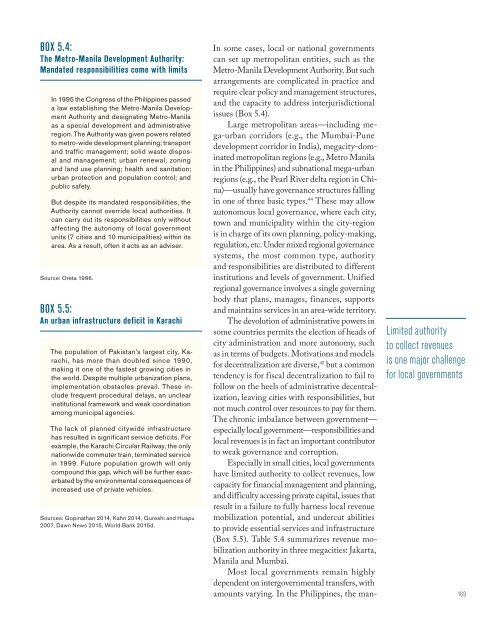SHAPING THE FUTURE HOW CHANGING DEMOGRAPHICS CAN POWER HUMAN DEVELOPMENT
1VPo4Vw
1VPo4Vw
You also want an ePaper? Increase the reach of your titles
YUMPU automatically turns print PDFs into web optimized ePapers that Google loves.
BOX 5.4:<br />
The Metro-Manila Development Authority:<br />
Mandated responsibilities come with limits<br />
In 1995 the Congress of the Philippines passed<br />
a law establishing the Metro-Manila Development<br />
Authority and designating Metro-Manila<br />
as a special development and administrative<br />
region. The Authority was given powers related<br />
to metro-wide development planning; transport<br />
and traffic management; solid waste disposal<br />
and management; urban renewal, zoning<br />
and land use planning; health and sanitation;<br />
urban protection and population control; and<br />
public safety.<br />
But despite its mandated responsibilities, the<br />
Authority cannot override local authorities. It<br />
can carry out its responsibilities only without<br />
affecting the autonomy of local government<br />
units (7 cities and 10 municipalities) within its<br />
area. As a result, often it acts as an adviser.<br />
Source: Oreta 1996.<br />
BOX 5.5:<br />
An urban infrastructure deficit in Karachi<br />
The population of Pakistan’s largest city, Karachi,<br />
has more than doubled since 1990,<br />
making it one of the fastest growing cities in<br />
the world. Despite multiple urbanization plans,<br />
implementation obstacles prevail. These include<br />
frequent procedural delays, an unclear<br />
institutional framework and weak coordination<br />
among municipal agencies.<br />
The lack of planned citywide infrastructure<br />
has resulted in significant service deficits. For<br />
example, the Karachi Circular Railway, the only<br />
nationwide commuter train, terminated service<br />
in 1999. Future population growth will only<br />
compound this gap, which will be further exacerbated<br />
by the environmental consequences of<br />
increased use of private vehicles.<br />
Sources: Gopinathan 2014, Kahn 2014, Qureshi and Huapu<br />
2007, Dawn News 2015, World Bank 2015d.<br />
In some cases, local or national governments<br />
can set up metropolitan entities, such as the<br />
Metro-Manila Development Authority. But such<br />
arrangements are complicated in practice and<br />
require clear policy and management structures,<br />
and the capacity to address interjurisdictional<br />
issues (Box 5.4).<br />
Large metropolitan areas—including mega-urban<br />
corridors (e.g., the Mumbai-Pune<br />
development corridor in India), megacity-dominated<br />
metropolitan regions (e.g., Metro Manila<br />
in the Philippines) and subnational mega-urban<br />
regions (e.g., the Pearl River delta region in China)—usually<br />
have governance structures falling<br />
in one of three basic types. 44 These may allow<br />
autonomous local governance, where each city,<br />
town and municipality within the city-region<br />
is in charge of its own planning, policy-making,<br />
regulation, etc. Under mixed regional governance<br />
systems, the most common type, authority<br />
and responsibilities are distributed to different<br />
institutions and levels of government. Unified<br />
regional governance involves a single governing<br />
body that plans, manages, finances, supports<br />
and maintains services in an area-wide territory.<br />
The devolution of administrative powers in<br />
some countries permits the election of heads of<br />
city administration and more autonomy, such<br />
as in terms of budgets. Motivations and models<br />
for decentralization are diverse, 45 but a common<br />
tendency is for fiscal decentralization to fail to<br />
follow on the heels of administrative decentralization,<br />
leaving cities with responsibilities, but<br />
not much control over resources to pay for them.<br />
The chronic imbalance between government—<br />
especially local government—responsibilities and<br />
local revenues is in fact an important contributor<br />
to weak governance and corruption.<br />
Especially in small cities, local governments<br />
have limited authority to collect revenues, low<br />
capacity for financial management and planning,<br />
and difficulty accessing private capital, issues that<br />
result in a failure to fully harness local revenue<br />
mobilization potential, and undercut abilities<br />
to provide essential services and infrastructure<br />
(Box 5.5). Table 5.4 summarizes revenue mobilization<br />
authority in three megacities: Jakarta,<br />
Manila and Mumbai.<br />
Most local governments remain highly<br />
dependent on intergovernmental transfers, with<br />
amounts varying. In the Philippines, the man-<br />
Limited authority<br />
to collect revenues<br />
is one major challenge<br />
for local governments<br />
169


